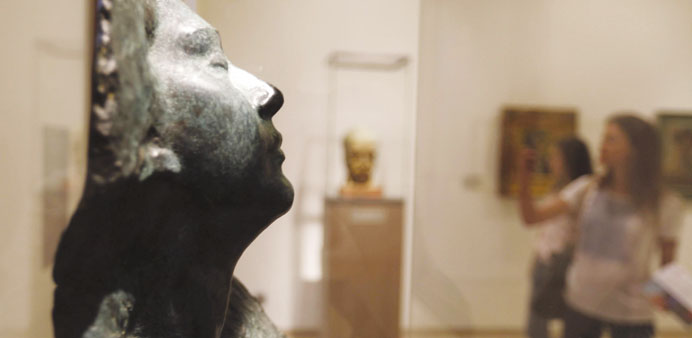Visitors take pictures of artwork displayed at the Sursock Museum in Beirut yesterday.
Reuters/Beirut
A stone’s throw from dramatic street protests shaking central Beirut, art lovers gathered to celebrate the reopening of a museum of modern art which they hailed as a symbol of the Lebanese capital’s resilience through conflict and turmoil.
The Sursock Museum, an Italianate mansion built for an Ottoman aristocrat, first opened to the public when he bequeathed it to the city more than 60 years ago.
In the 1960s, when Beirut flourished as the Middle East’s capital of culture, the Sursock galleries boasted paintings and sculptures by artists from Lebanon and across the world.
The country’s 1975-1990 civil war all but shut down the museum, and it closed again in 2008 for extensive renovation, before finally opening this week for a third time.
“Sursock museum is a part of Lebanon’s modern history, a history that the war of 1975 tried to erase,” said Rafic Chlala, a former presidential adviser attending a reception to mark its latest reincarnation. “But this museum resisted and stayed a cultural landmark in Lebanon.”
For the next three months, the museum is displaying 200 works of art tracing Beirut’s evolution from a provincial Ottoman town in 1800 to a booming national capital in the 1960s - including late 19th century photographs, a watercolour by Lebanese artist Amine el Bacha and a 1966 piece by British artist David Hockney.
A more permanent exhibition shows the development of Lebanese modern art over the last two centuries.
Mingling with the artists at Thursday’s reopening were government ministers, whose resignation was being demanded by scores of demonstrators chanting the refrain of the Arab Spring uprisings: “The people demand the overthrow of the regime”.
Riot police fired teargas and water cannon to disperse the demonstrators.
Environment Minister Mohamed al-Mashnouk, a focus of the protesters’ anger, said the Sursock Museum was a home to the country’s artistic and cultural treasures.
“Lebanese people need this space, in the midst of the sadness and tragedies we are living through,” he said.

